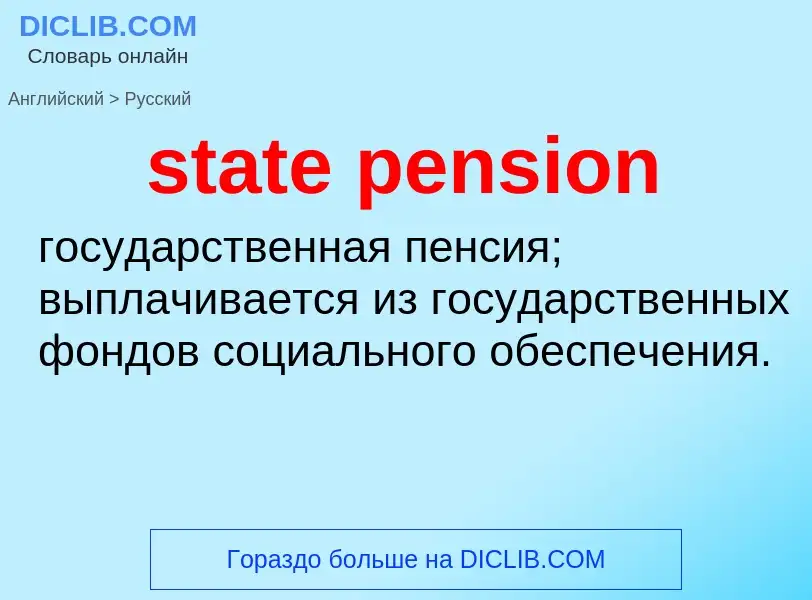Перевод и анализ слов искусственным интеллектом ChatGPT
На этой странице Вы можете получить подробный анализ слова или словосочетания, произведенный с помощью лучшей на сегодняшний день технологии искусственного интеллекта:
- как употребляется слово
- частота употребления
- используется оно чаще в устной или письменной речи
- варианты перевода слова
- примеры употребления (несколько фраз с переводом)
- этимология
state pension - перевод на русский
['penʃ(ə)n]
существительное
['penʃ(ə)n]
общая лексика
пенсия
пособие
субсидия (артистам и т. п.)
пансион
пансионат
устаревшее выражение
взятка
плата за услуги
юриспруденция
совещание членов адвокатской корпорации «Грейз Инн»
глагол
['pɔŋsjɔŋ]
общая лексика
назначать пенсию
субсидировать
[s(j)u:pər'ænjueit]
глагол
общая лексика
увольнять по старости
переводить на пенсию
быть слишком старым для занимаемой должности
стать переростком (о школьнике)
исключать из школы как переростка
устареть
отжить свой век
отвергать (что-л.) как устаревшее или старомодное
сдать в архив
увольнять по старости или по нетрудоспособности переводить на пенсию
изымать из употребления (за ненужностью)
выйти из употребления
общая лексика
пенсия по старости
страхование
пенсионный план
система пенсионного обеспечения (конкретная программа, по которой работодатель, а иногда также и работник, периодически перечисляет средства на специальный счет, средства с которого под управлением пенсионного фонда инвестируются в различные активы, а впоследствии направляются на выплаты пенсий данному работнику)
Смотрите также
[,əuld,eɪdʒ'penʃən]
общая лексика
пенсия по старости
Определение
Википедия

A pension (, from Latin pensiō, "payment") is a fund into which a sum of money is added during an employee's employment years and from which payments are drawn to support the person's retirement from work in the form of periodic payments. A pension may be a "defined benefit plan", where a fixed sum is paid regularly to a person, or a "defined contribution plan", under which a fixed sum is invested that then becomes available at retirement age. Pensions should not be confused with severance pay; the former is usually paid in regular amounts for life after retirement, while the latter is typically paid as a fixed amount after involuntary termination of employment before retirement.
The terms "retirement plan" and "superannuation" tend to refer to a pension granted upon retirement of the individual. Retirement plans may be set up by employers, insurance companies, the government, or other institutions such as employer associations or trade unions. Called retirement plans in the United States, they are commonly known as pension schemes in the United Kingdom and Ireland and superannuation plans (or super) in Australia and New Zealand. Retirement pensions are typically in the form of a guaranteed life annuity, thus insuring against the risk of longevity.
A pension created by an employer for the benefit of an employee is commonly referred to as an occupational or employer pension. Labor unions, the government, or other organizations may also fund pensions. Occupational pensions are a form of deferred compensation, usually advantageous to employee and employer for tax reasons. Many pensions also contain an additional insurance aspect, since they often will pay benefits to survivors or disabled beneficiaries. Other vehicles (certain lottery payouts, for example, or an annuity) may provide a similar stream of payments.
The common use of the term pension is to describe the payments a person receives upon retirement, usually under pre-determined legal or contractual terms. A recipient of a retirement pension is known as a pensioner or retiree.


![Public sector workers in [[Leeds]] striking over pension changes by the government in November 2011 Public sector workers in [[Leeds]] striking over pension changes by the government in November 2011](https://commons.wikimedia.org/wiki/Special:FilePath/Leeds public sector pensions strike in November 2011 14.jpg?width=200)
![[[2010 French pension reform strikes]] [[2010 French pension reform strikes]]](https://commons.wikimedia.org/wiki/Special:FilePath/Manifestation du 2 Octobre 2010 - Bastille (5046583719).jpg?width=200)
![[[2018 Russian pension protests]] [[2018 Russian pension protests]]](https://commons.wikimedia.org/wiki/Special:FilePath/Митинг 2 сентября 2018 пенсии Суворовская площадь (Москва) 05.jpg?width=200)
